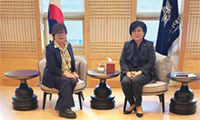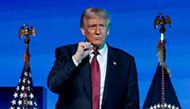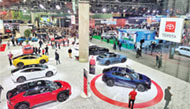WILL THE DOWN market never end- For months, policy makers around the world have tried bailouts, interest rate cuts, anything they could think of, really, to bring global markets out of their deepening depression. Once in a while, the markets do move up - only to fall again. Nothing seems to work for long.
Perhaps there’s a reason that everyone has overlooked: hormones.
If a research paper published earlier this year is correct, traders have become prisoners of their endocrine systems - testosterone, the elixir of male aggressiveness, during a bull market; cortisol, a steroid that helps the body deal with stress, when fear takes over.
The study suggests that raging hormones might explain why the men who rule the global markets send them up when they’re winning, and down when they panic.
One investment strategist intuitively grasped the situation when he recently told The New York Times: “Normally markets are driven by fear and greed. Now it’s fear and fear.” In other words, instead of a rhythm of testosterone alternating with cortisol, it’s been cortisol and more cortisol for weeks. Actually there was a step in between - greed and greed, the bubble period. That’s when traders were making a lot of money, which made them pump out extra testosterone, grow overconfident and overcompetitive, and take on more and more risks that eventually went bust.
Now, the lingering presence of cortisol makes them irrationally fearful, negative and risk averse.
John M. Coates, a former trader who is now a senior research fellow in neuroscience and finance at the University of Cambridge, and a colleague, Joseph Herbert, laid it all out in the study, published in the Proceedings of the National Academy of Sciences. Measuring steroid levels of traders in the City of London, they demonstrated that successful traders were heavily influenced during market booms by a positive feedback loop fueled by increased levels of testosterone.
It’s akin, Dr. Coates says, to the “winner’s effect” among male athletes, in which successive victories push testosterone levels higher and higher, giving the winner an advantage - until he begins to misjudge risk and take stupid chances. “Testosterone doesn’t create bubbles, but it exaggerates them,” Dr. Coates said. “It’s possible that bubbles are a male phenomenon.”
Likewise, when markets tumble, traders are stressed out by the uncertainty and volatility and produce a lot of cortisol; they fall into a negative feedback loop that turns them into emotional fear-mongers, rather than analytical thinkers. So they’re now prolonging and deepening the market plunge, and dragging down the economy.
With markets swinging scarily from one day to the next, traders have become bundles of dueling hormones.
Though Dr. Coates hasn’t studied it - yet - he said “it’s possible” that testosterone-fueled competitiveness may even have driven investment bankers to be ever more creative in inventing the risky, complex securities designed to deliver more leverage and better returns.
They got so creative that few people understood their risks.
But Jonathan D. Cohen, director of the neuroscience program at Princeton University in New Jersey, hesitated to agree. “This is intriguing, but correlation is not causation,” he said. “That’s the first thing we learn in science.”
Still, Dr. Bruce McEwen, head of the neuroendocrinology lab of Rockefeller University in New York, said “it’s kind of exciting.” “Who knows,” he asked, “what other hormones are doing as well? There’s a lot we don’t know, because people don’t think about hormones in this context, but this is an aspect we have to consider. All bets are off.”
Dr. McEwen said it was too early to make recommendations to policy makers.
Not so Dr. Coates: The question reminded him of a headline in The Financial Times: “Icelandic Women to Clean Up Male Mess.” The article reported that Iceland had turned to two women to lead banks nationalized during the country’s brush with bankruptcy.
Women, Dr. Coates explained, have only about 10 percent of the testosterone men have; their judgment is not confused by it. He said he also suspected that women were less likely to produce excess cortisol.
So he advised getting “more women and older men on trading floors.”
스마터리빙
more [ 건강]
[ 건강]이제 혈관 건강도 챙기자!
[현대해운]우리 눈에 보이지 않기 때문에 혈관 건강을 챙기는 것은 결코 쉽지 않은데요. 여러분은 혈관 건강을 유지하기 위해 어떤 노력을 하시나요?
 [ 건강]
[ 건강]내 몸이 건강해지는 과일궁합
 [ 라이프]
[ 라이프]벌레야 물럿거라! 천연 해충제 만들기
 [ 건강]
[ 건강]혈압 낮추는데 좋은 식품
[현대해운]혈관 건강은 주로 노화가 진행되면서 지켜야 할 문제라고 인식되어 왔습니다. 최근 생활 패턴과 식생활의 변화로 혈관의 노화 진행이 빨라지고
사람·사람들
more
창작 뮤지컬 ‘도산’ 웍샵
창작 뮤지컬 ‘도산’이 뉴욕 맨해튼에서 미국배우조합 리딩 웍샵을 성공적으로 마쳤다. LA 무대예술인그룹 시선(대표 클라라 신)이 제작한 이 작…

“한국어 교육 확산 협력”
한국어진흥재단(이사장 모니카 류)이 숙명여대(총장 문시연)와 한국어 교육 확산을 위한 협력에 나선다. 한국어진흥재단의 모니카 류 이사장은 지난…
송년행사 시즌 ‘돌입’ 12월 첫 주부터 본격
추수감사절 연휴를 기점으로 남가주 한인사회가 본격적인 송년행사 시즌에 돌입한다. 한 해를 마무리하고 새해를 준비하기 위한 각 단체·동문회의 연…
KYCC·VWKC·주민의회 등 합동 타운 대청소 …
한인타운청소년회관(KYCC)과 헤더 허트 시의원(LA 10지구) 사무실, 그리고 행사에는 윌셔 한인타운 커뮤니티 목소리(VWKC), 내셔널 유…
ROTC 남가주 동지회 골프 모임
ROTC 남가주 동지회(회장 이창훈)는 지난 22일 라미라다 골프코스에서 골프 모임을 열었다. 이날 행사에는 30여 명이 참석해 라운딩을 함께…
많이 본 기사
- 중서부 폭설로 추수감사절 연휴 주말 ‘항공대란’
- 명문 노스웨스턴대, 7천500만 달러 내고 트럼프 행정부와 합의
- 북한 라자루스·김수키 58건… ‘한국 겨냥’ 공격 집중됐다
- ‘세리에A 러브콜’ 韓 국대 풀백, 빅리그 도전 절호의 기회 ‘떠나고 싶다’... “이적료 70억” 현지 보도
- 내년도 예산안 시한 이틀 앞으로…여야 원내대표 막판 협상 돌입
- 美·우크라, 30일 플로리다서 협상…최종 종전안 마련 여부 관심
- ‘SM 최초 걸 그룹’ S.E.S. 바다 “이수만 덕분에”..데뷔 28주년 자축
- 함은정♥김병우·윤정수♥원진서·박진주, 오늘(30일,한국시간) 웨딩 릴레이
- ‘韓 간판’ 최민정·김길리, 월드투어 1500m·500m 예선 통과... 메달 도전 순항
- HD현대오일뱅크, 美 커뮤케이션 제작물 평가대회서 대상
- 누리호가 연 ‘우주 제약’ 시대…미세중력서 신약 만든다
- ‘3천만’ 고객정보 유출 쿠팡…피해 5개월간 몰랐다
- 北김정은 “공군에 새 전략자산과 임무…핵전쟁억제력 일익 담당”
- 지상렬, ‘♥신보람’과 공개 열애.. “프러포즈 한다” 의미심장 예언
- ‘주토피아2’ 북미 추수감사절 역대 2위 흥행…전세계 1억3천320만달러
- “어릴 적 호두까기 인형 보면서 발레리나 꿈 키웠죠”
- 중서부 폭설로 추수감사절 연휴 주말 ‘항공대란’
- “어머니 화장실에 숨으시라, 통화가 … 1
- 소비둔화 우려에도 블프 매출 4%↑…AI 쇼핑도우미도 기여
- 교황, 이스탄불 블루모스크 방문…신발 벗고 존중 표시
- 조지아 사태 수습하려…주한대사관 사업 비자 인터뷰 확대
- 트럼프 위협받는 베네수엘라 군대, 오합지졸에 낡아빠진 무기
- 트럼프 “베네수 영공 폐쇄” 압박…베네수 “식민주의적 위협”
- ‘인니 홍수·산사태’ 사망자 225명으로 늘어…100명 넘게 실종
- ‘홍콩 화재’ 이재민들, 막막함 호소…아파트 복구도 첩첩산중
- 故 이순재, 올해 5월 병상 모습 공개.. “지금 하고 싶은 것? 작품 뿐”
- 아마존, ‘블프’ 대목 앞두고 외부 AI쇼핑 도구 대거 차단
- “제3세계 이민 영구 중단 불법입국 수백만 명 추방”
- ‘아파트 화재참사’ 홍콩, 사흘 애도 기간 선포…실종 150명
- 美, 망명신청 결정 전면중단…제3세계 이주민 차단에 속도
- 홍콩 화재 생존자가 전한 참상… “집이라는 연옥에 갇혀”
- 종전안에 비친 푸틴 속내…우크라 러 위성국 만들기 아니냐 관측
- 트럼프, 대법에 ‘관세 적법’ 결정 촉구… “美 위해 옳은일 하길”
- 트럼프, 대법에 ‘관세 적법’ 결정 촉구… “美 위해 옳은일 하길”
- 쿠팡 “개인정보 노출계정 3천370만개”…사실상 다 털렸다
- ‘반인도적 범죄’ 두테르테 전 필리핀 대통령 석방 요청 기각
- 복수국적 한인2세 피해 방지 ‘국적유보 신고제’ 추진
- 김혜성-로버츠 달리기 시합이 LAD 우승 이끌었다니, “선수들 매우 좋아해, 긴장 풀리며 2연승”
- 인도 “美와 관세 협상 마무리 단계…연말까지 1단계 협정 기대”
- ‘아쉽다’ 차준환 점프 실수, 올림픽 1차 선발전 쇼트 3위... ‘09년생 기대주’ 최하빈 깜짝 1위
- “인텔, 애플 M시리즈 칩 생산 논의…이르면 2027년부터 출하”
- ‘대장동 50억 클럽’ 곽상도 아들 징역 9년·벌금 50억 구형
- 에어버스 리콜 사태, 큰 혼란없이 진정 국면…지연·결항 제한적
- 방탄소년단 뷔, 이 날씨에 민소매만 입고 한강 러닝.. “바람이 차다”
- 뉴욕증시, 블랙 프라이데이 소비 기대감…강세 마감
- “K뷰티, 올 미국 판매 37% 급증…소비자 75%가 MZ”
- 방탄소년단 2026 월드투어 매출 전망 ‘쑥쑥↑’,최대 1조4천억원 예측[K-EYES]
- K-헤어케어 트리셀, Costco 250개점에 런칭
- 송진우·알베르토, 역사왜곡 논란..다시금 재조명된 전효성
- 라티노 이웃과 함께 땡스 기빙
1/5지식톡

-
 테슬라 자동차 시트커버 장착
0
테슬라 자동차 시트커버 장착
0테슬라 시트커버, 사놓고 아직 못 씌우셨죠?장착이 생각보다 쉽지 않습니다.20년 경력 전문가에게 맡기세요 — 깔끔하고 딱 맞게 장착해드립니다!장착비용:앞좌석: $40뒷좌석: $60앞·뒷좌석 …
-
 식당용 부탄가스
0
식당용 부탄가스
0식당용 부탄가스 홀세일 합니다 로스앤젤레스 다운타운 픽업 가능 안녕 하세요?강아지 & 고양이 모든 애완동물 / 반려동물 식품 & 모든 애완동물/반려동물 관련 제품들 전문적으로 홀세일/취급하는 회사 입니다 100% …
-
 ACSL 국제 컴퓨터 과학 대회, …
0
ACSL 국제 컴퓨터 과학 대회, …
0웹사이트 : www.eduspot.co.kr 카카오톡 상담하기 : https://pf.kakao.com/_BEQWxb블로그 : https://blog.naver.com/eduspotmain안녕하세요, 에듀스팟입니다…
-
 바디프렌드 안마의자 창고 리퍼브 세…
0
바디프렌드 안마의자 창고 리퍼브 세…
0거의 새제품급 리퍼브 안마의자 대방출 한다고 합니다!8월 23일(토)…24일(일) 단 이틀!특가 판매가Famille: $500 ~ $1,000Falcon: $1,500 ~ $2,500픽업 & 배송직접 픽업 가능LA…
-
 바디프렌드 안마의자 창고 리퍼브 세…
0
바디프렌드 안마의자 창고 리퍼브 세…
0거의 새제품급 리퍼브 안마의자 대방출 한다고 합니다!8월 23일(토)…24일(일) 단 이틀!특가 판매가Famille: $500 ~ $1,000Falcon: $1,500 ~ $2,500픽업 & 배송직접 픽업 가능LA…
케이타운 1번가
오피니언

오바마케어 보조금 연장 이뤄져야

UC, 등록금 인상 자제 노력 더 해야한다
 마크 A. 시쎈 / 워싱턴포스트 칼럼니스트
마크 A. 시쎈 / 워싱턴포스트 칼럼니스트 [마크 A. 시쎈 칼럼] 트럼프 승리를 파괴하는 백인 우월주의자들
 유경재 나성북부교회 담임목사
유경재 나성북부교회 담임목사 [한국춘추] 감사의 힘
 김인자 시인·수필가
김인자 시인·수필가 [금요단상] 장미의 이름, 진리의 이름
 최호근 / 고려대 사학과 교수
최호근 / 고려대 사학과 교수 [역사 속 하루] 태즈메이니아 섬 발견, 비극의 시작
 최형욱 / 서울경제 기자
최형욱 / 서울경제 기자 [만화경] AI 거품론과 ‘그린스펀 오판’
 조재성 LA 포럼 회장·도시비평가
조재성 LA 포럼 회장·도시비평가 [조재성 박사의 두 도시 이야기] 코리아타운, 불완전함의 아름다움
 김재천 서강대 국제대학원 교수
김재천 서강대 국제대학원 교수 [김재천 칼럼] 경제로 안보를 사는 시대
1/3지사별 뉴스

메이시스 추수감사절 퍼레이드
올해로 99회를 맞이한 메이시스 추수감사절 퍼레이드가 27일 맨하탄에서 화려하게 펼쳐졌다. 올해 퍼레이드에는 전 세계적으로 열풍을 일으킨 ‘케…
복수국적 한인2세 피해 방지 ‘국적유보 신고제’ 추진

라티노 이웃과 함께 땡스 기빙
추수감사절 아침, 갑자기 떨어진 기온에 찬바람까지 불면서 겨울이 다가옴을 실감할 수 있었다. 도시빈민을 섬기는 굿스푼선교회(대표 김재억 목사)…
MA주 공공안전보안부장관에 진아 권

중서부 폭설로 추수감사절 연휴 주말 ‘항공대란’
추수감사절 연휴 주말인 29일 중서부 일대를 중심으로 폭설이 내리면서 여객기 1천여편의 운항이 취소되고 수천 편의 운항이 지연됐다.항공편 추적…
피아니스트 조성진, 내년 1월 SF에 온다

오늘 하루 이 창 열지 않음 닫기 


















































.png)


댓글 안에 당신의 성숙함도 담아 주세요.
'오늘의 한마디'는 기사에 대하여 자신의 생각을 말하고 남의 생각을 들으며 서로 다양한 의견을 나누는 공간입니다. 그러나 간혹 불건전한 내용을 올리시는 분들이 계셔서 건전한 인터넷문화 정착을 위해 아래와 같은 운영원칙을 적용합니다.
자체 모니터링을 통해 아래에 해당하는 내용이 포함된 댓글이 발견되면 예고없이 삭제 조치를 하겠습니다.
불건전한 댓글을 올리거나, 이름에 비속어 및 상대방의 불쾌감을 주는 단어를 사용, 유명인 또는 특정 일반인을 사칭하는 경우 이용에 대한 차단 제재를 받을 수 있습니다. 차단될 경우, 일주일간 댓글을 달수 없게 됩니다.
명예훼손, 개인정보 유출, 욕설 등 법률에 위반되는 댓글은 관계 법령에 의거 민형사상 처벌을 받을 수 있으니 이용에 주의를 부탁드립니다.
Close
x